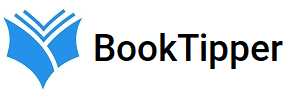Featured Non-Fiction & Biography

A MYSTERY OF MYSTERIES
by Mark Dawidziak
A Mystery of Mysteries is a brilliant biography of Edgar Allan Poe that examines the renowned author’s life through the prism of his mysterious death and its many possible causes.
It is a moment shrouded in horror and mystery. Edgar Allan Poe died on October 7, 1849, at just forty, in a painful, utterly bizarre manner that would not have been out of place in one of his own tales of terror. What was the cause of his untimely death, and what happened to him during the three missing days before he was found, delirious and “in great distress” on the streets of Baltimore, wearing ill-fitting clothes that were not his own?
Mystery and horror. Poe, who remains one of the most iconic of American writers, died under haunting circumstances that reflect the two literary genres he took to new heights. Over the years, there has been a staggering amount of speculation about the cause of death, from rabies and syphilis to suicide, alcoholism, and even murder. But many of these theories are formed on the basis of the caricature we have come to associate with Poe: the gloomy-eyed grandfather of Goth, hunched over a writing desk with a raven perched on one shoulder, drunkenly scribbling his chilling masterpieces. By debunking the myths of how he lived, we come closer to understanding the real Poe―and uncovering the truth behind his mysterious death, as a new theory emerges that could prove the cause of Poe’s death was haunting him all his life.
In a compelling dual-timeline narrative alternating between Poe’s increasingly desperate last months and his brief but impactful life, Mark Dawidziak sheds new light on the enigmatic master of macabre.
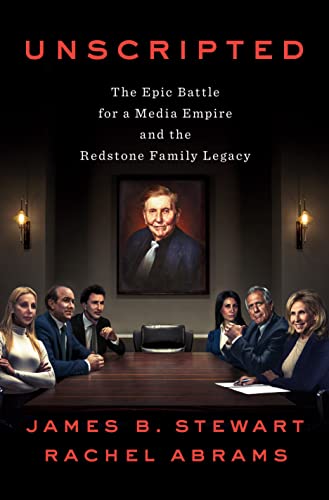
UNSCRIPTED
by James B. Stewart & Rachel Abrams
“Addicted to Succession? Well, here’s the real thing.” – The Hollywood Reporter
The shocking inside story of the struggle for power and control at Paramount Global, the multibillion-dollar entertainment empire controlled by the Redstone family, and the dysfunction, misconduct, and deceit that threatened the future of the company, from the Pulitzer Prize–winning journalists who first broke the news
In 2016, the fate of Paramount Global—the multibillion-dollar entertainment empire that includes Paramount, CBS, MTV, Nickelodeon, Showtime, and Simon & Schuster—hung precariously in the balance. Its founder and head, ninety-three-year-old Sumner M. Redstone, was facing a very public lawsuit brought by a former romantic companion, Manuela Herzer—a lawsuit that placed Sumner’s deteriorating health and questionable judgment under a harsh light.
As one of the last in a long line of all-powerful media moguls, Sumner had been a relentlessly demanding boss, and an even more demanding father. When his daughter, Shari, took control of her father’s business, she faced the hostility of boards and management who for years had heard Sumner disparage her. Les Moonves, the popular CEO of CBS, felt particularly threatened and schemed with his allies on the board to strip Shari of power. But while he publicly battled Shari, news began to leak that Moonves had been involved in multiple instances of sexual misconduct, and he began working behind the scenes to try to make the stories disappear.
Unscripted is an explosive and unvarnished look at the usually secret inner workings of two public companies, their boards of directors, and a wealthy, dysfunctional family in the throes of seismic changes, from the Pulitzer Prize-winning journalists James B. Stewart and Rachel Abrams. Through the microcosm of Paramount, whose once victorious business model of cable fees and ticket sales is crumbling under the assault of technological advances, and whose workplace is undergoing radical change in the wake of #MeToo, Black Lives Matter, and a distaste for the old guard, Stewart and Abrams lay bare the battle for power at any price—and the carnage that ensued.

THE CLIMATE BOOK
by Greta Thunberg
We still have time to change the world. From Greta Thunberg, the world’s leading climate activist, comes the essential handbook for making it happen.
You might think it’s an impossible task: secure a safe future for life on Earth, at a scale and speed never seen, against all the odds. There is hope – but only if we listen to the science before it’s too late.
In The Climate Book, Greta Thunberg has gathered the wisdom of over one hundred experts – geophysicists, oceanographers and meteorologists; engineers, economists and mathematicians; historians, philosophers and indigenous leaders – to equip us all with the knowledge we need to combat climate disaster. Throughout, illuminating and often shocking grayscale charts, graphs, diagrams, photographs, and illustrations underscore their research and their arguments. Alongside them, she shares her own stories of demonstrating and uncovering greenwashing around the world, revealing how much we have been kept in the dark. This is one of our biggest challenges, she shows, but also our greatest source of hope. Once we are given the full picture, how can we not act? And if a schoolchild’s strike could ignite a global protest, what could we do collectively if we tried?
We are alive at the most decisive time in the history of humanity. Together, we can do the seemingly impossible. But it has to be us, and it has to be now.
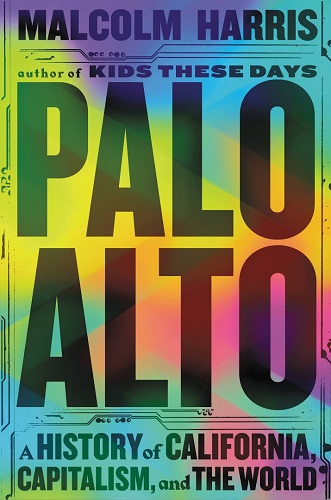
PALO ALTO
by Malcolm Harris
The history of Silicon Valley, from railroads to microchips, is an “extraordinary”* story of disruption and destruction, told for the first time in this comprehensive, jaw-dropping narrative. (*Greg Grandin, Pulitzer Prize-winning author of The End of the Myth)
Palo Alto’s weather is temperate, its people are educated and enterprising, its corporations are spiritually and materially ambitious and demonstrably world-changing. Palo Alto is also a haunted toxic waste dump built on stolen Indian burial grounds, and an integral part of the capitalist world system.
In PALO ALTO, the first comprehensive, global history of Silicon Valley, Malcolm Harris examines how and why Northern California evolved in the particular, consequential way it did, tracing the ideologies, technologies, and policies that have been engineered there over the course of 150 years of Anglo settler colonialism, from IQ tests to the “tragedy of the commons,” racial genetics, and “broken windows” theory. The Internet and computers, too. It’s a story about how a small American suburb became a powerful engine for economic growth and war, and how it came to lead the world into a surprisingly disastrous 21st century. PALO ALTO is an urgent and visionary history of the way we live now, one that ends with a clear-eyed, radical proposition for how we might begin to change course.

ALL THE BEAUTY IN THE WORLD
by Patrick Bringley
A fascinating, revelatory portrait of the Metropolitan Museum of Art and its treasures by a former New Yorker staffer who spent a decade as a museum guard.
Millions of people climb the grand marble staircase to visit the Metropolitan Museum of Art every year. But only a select few have unrestricted access to every nook and cranny. They’re the guards who roam unobtrusively in dark blue suits, keeping a watchful eye on the two million square foot treasure house. Caught up in his glamorous fledgling career at The New Yorker, Patrick Bringley never thought he’d be one of them. Then his older brother was diagnosed with fatal cancer and he found himself needing to escape the mundane clamor of daily life. So he quit The New Yorker and sought solace in the most beautiful place he knew.
To his surprise and the reader’s delight, this temporary refuge becomes Bringley’s home away from home for a decade. We follow him as he guards delicate treasures from Egypt to Rome, strolls the labyrinths beneath the galleries, wears out nine pairs of company shoes, and marvels at the beautiful works in his care. Bringley enters the museum as a ghost, silent and almost invisible, but soon finds his voice and his tribe: the artworks and their creators and the lively subculture of museum guards—a gorgeous mosaic of artists, musicians, blue-collar stalwarts, immigrants, cutups, and dreamers. As his bonds with his colleagues and the art grow, he comes to understand how fortunate he is to be walled off in this little world, and how much it resembles the best aspects of the larger world to which he gradually, gratefully returns.
In the tradition of classic workplace memoirs like Lab Girl and Working Stiff, All The Beauty in the World is a surprising, inspiring portrait of a great museum, its hidden treasures, and the people who make it tick, by one of its most intimate observers.

THE AMERICAN WAY
by Helene Stapinski & Bonnie Siegler
In this exuberant real-life adventure, the publisher of DC Comics comes to the rescue of a family trying to flee Nazi Berlin, their lives linking up with a dazzling cast of 20th century icons, all eagerly pursing the American dream.
Family lore had it that Bonnie Siegler’s grandfather crossed paths in Midtown Manhattan late one night in 1954 with Marilyn Monroe, her white dress flying up around her as she filmed a scene for The Seven Year Itch. Jules Schulback had his home movie camera with him, capturing what would become the only surviving footage of that legendary night. Bonnie wasn’t sure she quite believed her grandfather’s story…until, cleaning out his apartment, she found the film reel. The discovery would prompt her to investigate all of her grandfather’s seemingly tall tales—and lead her in pursuit of a remarkable piece of forgotten history bridging old Hollywood, the birth of the comic book, and the Holocaust.
The American Way is a vivacious story of two very different men both striving to make their way in New York, their lives intersecting with a glittering array of luminaries, from Billy Wilder and Joe DiMaggio to Superman creators Joe Shuster and Jerry Siegel. It’s a kaleidoscopic tale of hope and reinvention, of daring escapes and fake identities, of big dreams and the magic of movies, and what it means to be a real-life Superman.

WINNING FIXES EVERYTHING
by Evan Drellich
The reporter who broke the Houston Astros’ cheating scandal reveals how a baseball team could so dramatically descend into corruption, with never-before-told details of a broken management culture, the once-revered leaders who enabled it and the scandal itself.
Baseball, that old romantic game, has been defaced and consumed by corporate America. As Moneyball-thinking and Ivy League graduates grabbed hold of the sport, the Astros set out to build a cost-efficient winning machine on the principles of the outside business world, squeezing every dollar out of every transaction, player and employee.
In less than a decade, ex-Astros general manager Jeff Luhnow helped revolutionize the game. He created an environment that led to one of the worst cheating scandals in baseball history, a Shakespearean tragedy of innovation and failed change management. Through years of extensive interviews, former Houston Chronicle beat writer Evan Drellich, now a national writer for The Athletic, delivers the definitive account of baseball’s most controversial franchise and how a modern baseball team truly works—without the usual myth-spinning.
Drellich reveals the rise and fall of the Astros to be a collision of subcultures. The team’s top boss was a former McKinsey consultant who lived on the bleeding edge with no guardrails. He hired outsider after outsider to change the organization as quickly and cheaply as possible. The wins piled up, and so did the cash for the billionaire owner with a checkered business past. But not even a World Series title could cover up the rot.
All of it came at a cost to fans, employees, and the sport on a whole. But as Winning Fixes Everything makes clear, “The Astros Way” isn’t going anywhere. Drellich uses the saga of the Astros’ scandal to detail the evolution of baseball itself.

DYSCALCULIA
by Camonghne Felix
An epic meditation on loving yourself in the face of heartbreak, from the acclaimed author of Build Yourself a Boat, longlisted for the National Book Award
When Camonghne Felix goes through a monumental breakup, culminating in a hospital stay, everything—from her early childhood trauma and mental health to her relationship with mathematics—shows up in the tapestry of her healing. In this exquisite and raw reflection, Felix repossesses herself through the exploration of history she’d left behind, using her childhood “dyscalculia”—a disorder that makes it difficult to learn math—as a metaphor for the consequences of her miscalculations in love. Through reckoning with this breakup and other adult gambles in intimacy, Felix asks the question: Who gets to assert their right to pain?
Dyscalculia negotiates the misalignments of perception and reality, love and harm, and the politics of heartbreak, both romantic and familial.
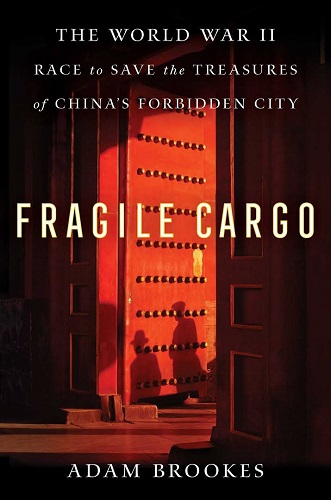
FRAGILE CARGO
by Adam Brookes
The gripping true story of the bold and determined museum curators who saved the priceless treasures of China’s Forbidden City in the years leading up to World War II and beyond.
Spring 1933: The silent courtyards and palaces of Peking’s Forbidden City, for centuries the home of Chinese emperors, are tense with fear and expectation. Japan’s aircrafts drone overhead, its troops and tanks are only hours away. All-out war between China and Japan is coming, and the curators of the Forbidden City are faced with an impossible question: how will they protect the vast imperial art collections in their charge? A difficult and monumental decision is made: to safeguard the treasures, they will need to be evacuated.
The magnificent collections contain a million pieces of art—objects that carry China’s deepest and most ancient memories. Among them are irreplaceable artefacts: exquisite paintings on silk, vanishingly rare Ming porcelain, and the extraordinary Stone Drums of Qin, which are adorned with 2,500-year-old inscriptions of crucial cultural significance.
For sixteen terrifying years, under the quiet leadership of museum director Ma Heng, the curators would go on to transport the imperial art collections thousands of miles across China—up rivers of white water, across mountain ranges, and through burning cities. In their search for safety the curators and their fragile, invaluable cargo journeyed through the maelstrom of violence, chaos, and starvation that was China’s Second World War.
Told for the first time in English and playing out across a vast historical canvas, this is the exhilarating story of a small group of men and women who, when faced with war’s onslaught on civilization, chose to resist. Fragile Cargo reminds us of the enduring power of beauty in a world beset by conflict and violence.
Still Hot in Non-Fiction & Biography

THE LIGHT WE CARRY
by Michelle Obama
#1 NEW YORK TIMES AND USA TODAY BESTSELLER • ONE OF TIME’S 100 MUST-READ BOOKS OF 2022 • In an inspiring follow-up to her critically acclaimed, #1 bestselling memoir Becoming, former First Lady Michelle Obama shares practical wisdom and powerful strategies for staying hopeful and balanced in today’s highly uncertain world.
There may be no tidy solutions or pithy answers to life’s big challenges, but Michelle Obama believes that we can all locate and lean on a set of tools to help us better navigate change and remain steady within flux. In The Light We Carry, she opens a frank and honest dialogue with readers, considering the questions many of us wrestle with: How do we build enduring and honest relationships? How can we discover strength and community inside our differences? What tools do we use to address feelings of self-doubt or helplessness? What do we do when it all starts to feel like too much?
Michelle Obama offers readers a series of fresh stories and insightful reflections on change, challenge, and power, including her belief that when we light up for others, we can illuminate the richness and potential of the world around us, discovering deeper truths and new pathways for progress. Drawing from her experiences as a mother, daughter, spouse, friend, and First Lady, she shares the habits and principles she has developed to successfully adapt to change and overcome various obstacles—the earned wisdom that helps her continue to “become.” She details her most valuable practices, like “starting kind,” “going high,” and assembling a “kitchen table” of trusted friends and mentors. With trademark humor, candor, and compassion, she also explores issues connected to race, gender, and visibility, encouraging readers to work through fear, find strength in community, and live with boldness.
“When we are able to recognize our own light, we become empowered to use it,” writes Michelle Obama. A rewarding blend of powerful stories and profound advice that will ignite conversation, The Light We Carry inspires readers to examine their own lives, identify their sources of gladness, and connect meaningfully in a turbulent world.
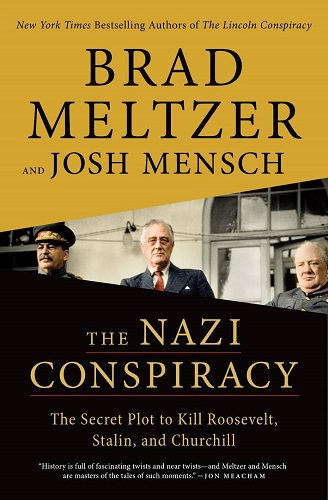
THE NAZI CONSPIRACY
by Brad Meltzer & Josh Mensch
INSTANT NEW YORK TIMES BESTSELLER
“An absolute home run! You will never look at WWII the same way again.” ―Brad Thor, #1 bestselling author
“Meltzer and Mensch are masters.” ―Jon Meacham, author The Soul of America
“A true story that reads like a thriller.” ―Alexander S. Vindman, LT. Col., U.S. Army (Ret.)
“An outstanding and memorable reading experience….a true page-turner from beginning to end.” ―Bookreporter.com
From the New York Times bestselling authors of The First Conspiracy and The Lincoln Conspiracy comes the little-known true story of a Nazi plot to kill FDR, Joseph Stalin, and Winston Churchill at the height of World War II.
In 1943, as the war against Nazi Germany raged abroad, President Franklin Roosevelt had a critical goal: a face-to-face sit-down with his allies Joseph Stalin and Winston Churchill. This first-ever meeting of the Big Three in Tehran, Iran, would decide some of the most crucial strategic details of the war. Yet when the Nazis found out about the meeting, their own secret plan took shape―an assassination plot that would’ve changed history.
A true story filled with daring rescues, body doubles, and political intrigue, The Nazi Conspiracy details FDR’s pivotal meeting in Tehran and the deadly Nazi plot against the heads of state of the three major Allied powers who attended it.
With all the hallmarks of a Brad Meltzer and Josh Mensch page-turner, The Nazi Conspiracy explores the great political minds of the twentieth century, investigating the pivotal years of the war in gripping detail. This meeting of the Big Three changed the course of World War II. Here’s the inside story of how it almost led to a world-shattering disaster.

THE BILL OF OBLIGATIONS
by Richard Haas
A New York Times Bestseller
A provocative guide to how we must reenvision citizenship if American democracy is to survive
The United States faces dangerous threats from Russia, China, North Korea, Iran, terrorists, climate change, and future pandemics. The greatest peril to the country, however, comes not from abroad but from within, from none other than ourselves. The question facing us is whether we are prepared to do what is necessary to save our democracy.
The Bill of Obligations is a bold call for change. In these pages, New York Times bestselling author Richard Haass argues that the very idea of citizenship must be revised and expanded. The Bill of Rights is at the center of our Constitution, yet our most intractable conflicts often emerge from contrasting views as to what our rights ought to be. As former Supreme Court Justice Stephen Breyer pointed out, “Many of our cases, the most difficult ones, are not about right versus wrong. They are about right versus right.” The lesson is clear: rights alone cannot provide the basis for a functioning, much less flourishing, democracy.
But there is a cure: to place obligations on the same footing as rights. The ten obligations that Haass introduces here are essential for healing our divisions and safeguarding the country’s future. These obligations reenvision what it means to be an American citizen. They are not a burden but rather commitments that we make to fellow citizens and to the government to uphold democracy and counter the growing apathy, anger, selfishness, division, disinformation, and violence that threaten us all. Through an expert blend of civics, history, and political analysis, this book illuminates how Americans can rediscover and recover the attitudes and behaviors that have contributed so much to this country’s success over the centuries.
As Richard Haass argues, “We get the government and the country we deserve. Getting the one we need, however, is up to us.” The Bill of Obligations gives citizens across the political spectrum a plan of action to achieve it.
